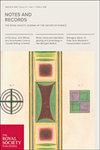解构培根主义:18世纪欲望的意义
IF 0.6
3区 哲学
Q3 HISTORY & PHILOSOPHY OF SCIENCE
Notes and Records-The Royal Society Journal of the History of Science
Pub Date : 2018-04-25
DOI:10.1098/rsnr.2018.0008
引用次数: 6
摘要
“巴科尼亚计划”的史学结构在二十世纪中期变得突出。自那以后,它形成了培根及其追随者的观点,尤其是关于培根功利主义的观点。它还设定了人们对培根对未来的愿景应该如何定义和规范的期望。然而,无论是培根还是那些声称追随他的人,都没有以纲领性的方式看待他的作品。培根未来主义写作的早期现代观点使他的追随者在重新绘制草图以适应不断变化的时代方面发挥了巨大的作用。本文首先探讨了“巴康主义纲领”在史学中的兴起。然后,它回到过去,概述了培根的第一代自封追随者为面向未来的写作所使用的一些丰富词汇。最后,为了测试培根的计划是如何在更长的时间内出现的,它跳到了彼得·肖(1694-1763)和约瑟夫·普里斯特利(1733-1804)身上。肖使用了培根的一个未来主义术语(desiderata),放弃了另一个术语(optativa),并发展了一个新类别的意义(hint)。肖的案例说明了即使是培根最狂热的追随者也希望在他们的权利范围内发挥创造力。Baconianism邀请了未来的重新起草和随意的发明,而不是坚持一个预测性的计划。本文章由计算机程序翻译,如有差异,请以英文原文为准。
Deprogramming Baconianism: The meaning of desiderata in the eighteenth century
The historiographical construct of the ‘Baconian programme’ rose to prominence in the mid-twentieth century. It has since shaped views of Bacon and his followers, particularly concerning Bacon's utilitarianism. It has also set expectations concerning how defined and prescriptive Bacon's vision of the future ought to be for later Baconians. Yet, neither Bacon nor those who claimed to follow him thought of his work in programmatic ways. The early modern view of Bacon's futuristic writing allowed his followers great agency in re-sketching it to fit changing times. This essay first follows the rise of a ‘Baconian programme’ in historiography. It then returns to the past to outline some of the rich vocabulary for future-oriented writing deployed by the first generation of Bacon's self-proclaimed followers. Finally, testing how Bacon's plans appeared over a longer durée, it skips forward to Peter Shaw (1694–1763) and Joseph Priestley (1733–1804). Shaw employed one of Bacon's futuristic terms (desiderata), dropped another (optativa) and developed the significance of a new category (hint). Shaw's case illustrates the creativity that even Bacon's most ardent followers expected to be within their rights. Baconianism invited future redrafting and haphazard invention, rather than adherence to a predictive programme.
求助全文
通过发布文献求助,成功后即可免费获取论文全文。
去求助
来源期刊
CiteScore
1.50
自引率
0.00%
发文量
45
审稿时长
>12 weeks
期刊介绍:
Notes and Records is an international journal which publishes original research in the history of science, technology and medicine.
In addition to publishing peer-reviewed research articles in all areas of the history of science, technology and medicine, Notes and Records welcomes other forms of contribution including: research notes elucidating recent archival discoveries (in the collections of the Royal Society and elsewhere); news of research projects and online and other resources of interest to historians; essay reviews, on material relating primarily to the history of the Royal Society; and recollections or autobiographical accounts written by Fellows and others recording important moments in science from the recent past.

 求助内容:
求助内容: 应助结果提醒方式:
应助结果提醒方式:


